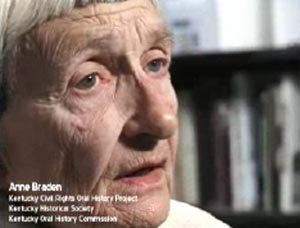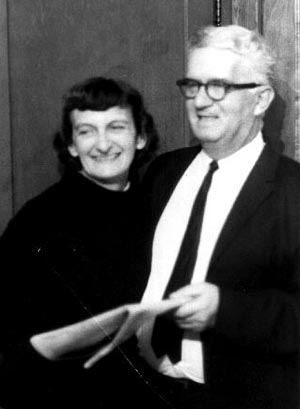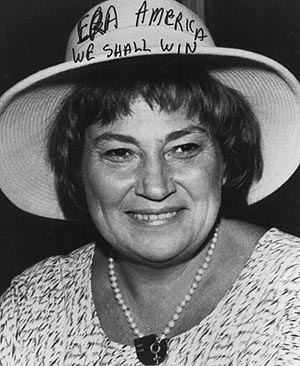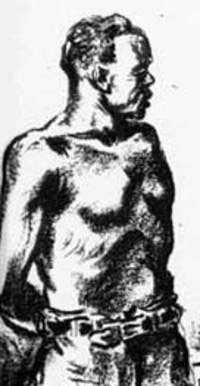Click on the image to watch video interviews with Anne Braden. |
The 6 March 2006 issue of the Louisville Courier-Journal reports the death at 81 of Anne Braden, the veteran Southern white civil rights leader and organizer of the fight for black integration and equality, and an American radical of untameable commitment who — together with her husband, Carl — educated several generations of young activists. She was honored not long ago in the Kentucky Civil Rights Hall of Fame.
 |
Anne and Carl Braden — both lifelong socialists who were for many years close to the Communist Party — gained national attention in 1954, when they bought a house in an all-white Louisville suburb for Andrew Wade and his wife, an African-American couple. A cross was burned near the house, shots were fired into it, and, finally, the Wade home was bombed. Although it was common knowledge who did it, the grand jury called the Bradens to testify. The Bradens’ efforts also led to Carl Braden being convicted on state sedition charges before he later was cleared, but only after serving seven months in prison. The Bradens were active in a range of human rights and integration organizations where they met and became friends with the Wades. The decision to buy the house for the Wades was not difficult. Anne Braden later recalled it in her autobiography, The Wall Between (Monthly Review Press, 1958; reissued in 1999 by University of Tennessee Press, with a foreward by Julian Bond):
The decision . . . was simple and natural as breathing, for any other answer [other than yes] would have been unthinkable. I went back to my chores . . . little knowing that Carl and I had just made one of the major decisions of our lives.
At this time, Anne was at home raising the children and Carl was working as a copy editor for the Louisville Courier-Journal, then one of the South’s more liberal newspapers (something the Courier-Journal did not see fit to mention in its obituary of Anne).
In The Wall Between, Anne also recalled her first appearance before the all-white Louisville grand jury convened to investigate the bombing of the house she and her husband had bought for the Wades:
The day they met, September 15, was my son’s third birthday. I was the first one called. I’d only been there a few minutes when I realized it was not the bombing that was under investigation. It was me! They began by asking me what organizations I belonged to and what books I had in my house. I’d heard that questions like those were being asked by HUAC, but I didn’t expect them from the grand jury. I told them, “It’s none of your business what my affiliations or reading habits are. It doesn’t have a thing to do with who blew up this house.” The same thing happened when Carl went there. The next day the prosecutor made a statement that there were two theories about the bombing. One was that the neighbors blew it up to get the Wades out. The other was that it was a Communist plot to stir up trouble between the races and bring about the overthrow of the governments of Kentucky and the United States. By the beginning of October, those of us who had been openly supportive of the Wades were charged with sedition. . . .
 |
Braden’s life was consecrated by a prize-winning 2002 book by Catherine Fosi, Subversive Southerner: Anne Braden and the Struggle for Racial Justice in the Cold War South (New York: Palgrave MacMillan, 2002, with a foreward by Angela Davis). As Michael Honey wrote in a lengthy review-essay on that book that appeared in the June 2004 issue of Monthly Review, a magazine to which the Bradens were close and to which Anne sometimes contributed:
Many of us who gained our organizing experience in the Southern movement came to know Anne Braden as part of an inseparable team, and one of this book’s strong points is that it helps us to understand Anne in relationship to her freedom-fighting husband Carl as well as in her own terms. A distinctive characteristic of the Bradens’ work was their ability to fight back against repression as a way to organize people and expose submerged issues. Repression, they often said, was just another opportunity to organize. They led dozens of campaigns to defend victims of racism, from Willie McGee (legally lynched by the state of Mississippi in 1952), to African-American and other movement organizers across the South in the 1960s, to Angela Davis in California, and to Ben Chavis and the Wilmington Ten in North Carolina in the early 1970s. Anti-repression organizing grew out of their own experiences and connections to the left. Anne had her first arrest in Mississippi as a pregnant white woman fighting phony rape charges against McGee, and she and Carl worked with William Patterson and the Civil Rights Congress against that and other cases of racism and repression during the early years of the red scare.
The Bradens always linked demands for equal rights for African Americans to a broader struggle against the inherent class oppression of capitalism. Anne in particular stressed that whites had to give up their limited and questionable racial privileges before a real movement of the left could succeed. The Bradens came to their understanding through personal experience in the labor left within the Congress of Industrial Organizations (CIO), which immeasurably helped to open up Southern organizing in the 1930s and 1940s. Through leftist union and civil rights work, they became ecumenical supporters of socialism and part of a popular front to build a broad movement for social change.
I had the privilege of meeting Anne Braden and hearing her speak at civil rights and radical youth conferences many times when I was a teenager in the 1960s, and her newspaper, The Southern Patriot, was must reading for movement activists then. The old radicals who came of age in the Great Depression, whose political engagement with the issues of the day never dimmed over the years, and who contributed so much to building social movements that changed America, are passing from the scene one by one. We shall not see the likes of Anne Braden again. Hers was a life forged by front-line engagement in bitter struggles for human justice and equality. We salute her memory and her courage, and on her passing we should recall the many lives she touched and changed for the better.
THE WILLIE McGEE CASE
 |
I cannot recall Anne Braden and her involvement in the Willie McGee case without also thinking of the late Rep. Bella Abzug of New York, my dear friend, whose successful first campaign for Congress I managed as a young man, and who was McGee’s appeals lawyer — she went to Mississippi in 1950 when she was pregnant with her first child to defend him. As Bella later recalled it in her autobiography:
I became involved in my first civil rights case [as chief counsel of appeals proceedings in 1950]. The man I defended — Willie McGee — was accused of raping a white woman, even though he and the woman had had a long-standing sexual relationship. That fact, of course, only made the crime all the more heinous to the Mississippi jury, and McGee was sentenced to death. Challenging the traditional practice of excluding blacks from the jury and arguing that Southern judges and juries reserved the death penalty for “rape” as a cruel and inhuman punishment for blacks only, I managed to get the Supreme Court to stay the execution twice.
 A drawing of Willie McGee by William Gropper, from Harry Raymond’s pamphlet “Save Willie McGee” (New Century Publishers, 1951) |
Yet the Supreme Court refused to rule on the case, and McGee’s execution date approached once again. In the final few days, Bella traveled to Jackson, Mississippi for a last minute clemency hearing. Local whites were incensed and had been threatening violence throughout the trials and appeals. When she arrived in town she found that no hotel would take her. Alone, and also pregnant, Bella spent the night awake in the locked bathroom stall of a bus station to avoid the Ku Klux Klan.
The next day Bella Abzug argued before the state Governor for six hours, but despite extensive publicity and protests organized by the Civil Rights Congress, McGee was executed in 1951.
Veteran radical journalist Doug Ireland has been a columnist for The Village Voice, the Paris daily Liberation, the New York Observer, New York magazine, and other publications — and he spent a decade covering European politics and culture while based in Paris. He can be reached through his blog, DIRELAND, at http://direland.typepad.com/.
